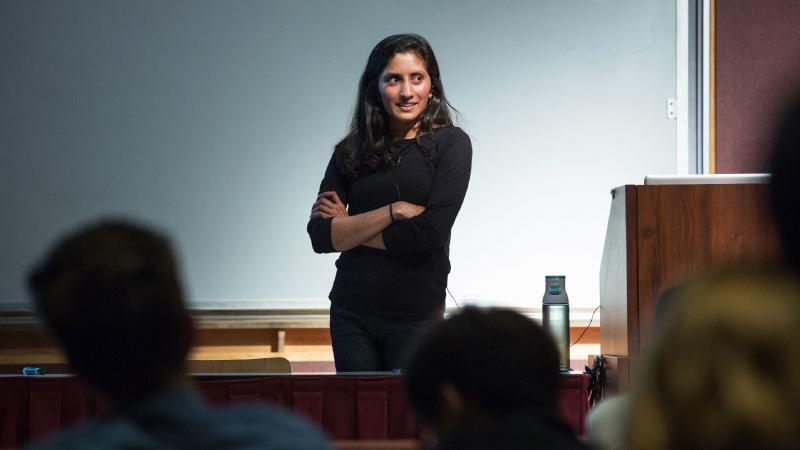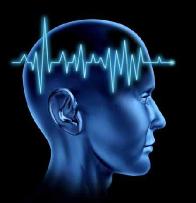Graduate Student Solves Quantum Verification Problem


Urmila Mahadev spent eight years in graduate school solving one of the most basic questions in quantum computation: How do you know whether a quantum computer has done anything quantum at all?
 In the spring of 2017, Urmila Mahadev found herself in what most graduate students would consider a pretty sweet position. She had just solved a major problem in quantum computation, the study of computers that derive their power from the strange laws of quantum physics. Combined with her earlier papers, Mahadev’s new result, on what is called blind computation, made it “clear she was a rising star,” said Scott Aaronson, a computer scientist at the University of Texas, Austin. Mahadev, who was 28 at the time, was already in her seventh year of graduate school at the University of California, Berkeley — long past the stage when most students become impatient to graduate. Now, finally, she had the makings of a “very beautiful Ph.D. dissertation,” said Umesh Vazirani, her doctoral adviser at Berkeley. But Mahadev did not graduate that year. She didn’t even consider graduating. She wasn’t finished. For more than five years, she’d had a different research problem in her sights, one that Aaronson called “one of the most basic questions you can ask in quantum computation.” Namely: If you ask a quantum computer to perform a computation for you, how can you know whether it has really followed your instructions, or even done anything quantum at all? read more ... https://www.quantamagazine.org/graduate-student-solves-quantum-verification-problem-20181008/
In the spring of 2017, Urmila Mahadev found herself in what most graduate students would consider a pretty sweet position. She had just solved a major problem in quantum computation, the study of computers that derive their power from the strange laws of quantum physics. Combined with her earlier papers, Mahadev’s new result, on what is called blind computation, made it “clear she was a rising star,” said Scott Aaronson, a computer scientist at the University of Texas, Austin. Mahadev, who was 28 at the time, was already in her seventh year of graduate school at the University of California, Berkeley — long past the stage when most students become impatient to graduate. Now, finally, she had the makings of a “very beautiful Ph.D. dissertation,” said Umesh Vazirani, her doctoral adviser at Berkeley. But Mahadev did not graduate that year. She didn’t even consider graduating. She wasn’t finished. For more than five years, she’d had a different research problem in her sights, one that Aaronson called “one of the most basic questions you can ask in quantum computation.” Namely: If you ask a quantum computer to perform a computation for you, how can you know whether it has really followed your instructions, or even done anything quantum at all? read more ... https://www.quantamagazine.org/graduate-student-solves-quantum-verification-problem-20181008/
 Article is LOCKED by author/seeder
Article is LOCKED by author/seeder
Tags
Who is online
55 visitors


I have to admit, most of this is beyond me lol.
and how do I get it to the front page?
Ok it eventually showed up, it must have taken the quantum route, lol
And even if you somehow had enough space to write down this description, there would be no way to get at it.
The Heisenberg Uncertainty Principle:
Introduced first in 1927, by the German physicist Werner Heisenberg , it states that the more precisely the position of some particle is determined, the less precisely its momentum can be known, and vice versa.
In other words, you can't measure both the mass and the velocity of a subatomic atomic at the same time... .
I never formally studied Quantum Physics, but I lived on a Yoga Ashram for several months. There they were teaching us "The Yoga Philosophy". (It was actually the principles of ancient Hindu mysticism, but they had to"sugar coat it" for those who didn't want to learn any "religious teachings"...but who considered Yoga teachings to be still "politically correct".
(cont'd from comment #3, above):
I'm not totally certain about this (at least in principle)-- but the teaching of ancient yogi masters seem to be congruent with the latest discoveries in Quantum Physics. (Sometimes they use different words-- but its the same stuff).
"simultaneously dead and alive...
All of this has to do with the nature of the Universe. And IIRC, one discussion that has frequently taken place is the nature of light-- is it a wave, or is it a particle? Apparently there is evidence for both.
Of course there's another possibility-- that it is both a wave and a particle.
How could that be?
Well, its all about energy-- and energy can change its form-- between a "solid" state, i.e. "matter" ("particles") and energy as a wave form. (E=MC2). Energy (wave) can be converted into matter (mass) and back again.
(continued from comment #3.1, above):
IIRC, the ancient Hindus had the concept of "Maya" (illusion). That what we perceive to be the physical universe-- of solid matter, time, and space is an illusion. That there another dimension of reality that normally people (at least those raised in the West) don't perceive.
Or . . . perhaps both states exist at the same time! Even . . .simultaneously!
There are various ways you can train your consciousness to perceive that other dimension-- the best methods , perhaps, being regular daily meditation. Over time that's extremely powerful!
(Or a good way to get started might be to go to a school such as this one).
Ha! i wondered how long it would take you to get to Hogwarts, lol...
Well, some paths make the trip considerably shorter than others ...(and then there's always the road less traveled ....)
Well, I'm a big fan of self-promotion. I often link to my seeds (but I also point out seeds by other people I find interesting).
Quantum computing is a fascinating subject. It involves creating computers that are exponentially faster than existing computers - solving problems with an exponential increase in parallelism. However, this requires an entirely new approach to computing which must manage both quantum superposition (probabilistic states) and quantum entanglement (enabling parallelism given superposition). Not only is this currently limited in terms of operations (classical computing is general purpose, quantum computing is currently very special purpose) but there are all sorts of fundamental problems that need to be solved. One such fundamental problem is determining that a computation is correct. This seed.
As it stands, quantum computing is at the very beginning of its lifecycle. It is equivalent to the situation classical computing was in during the 1950s - dealing with the reliability (or lack thereof) of vacuum tubes, magnetic core memory and trying to establish the fundamental operations and initial languages (e.g. assembler language) needed to provide the lowest level working computational mechanism.
Simple quantum computers exist today, but do not expect to see anything challenging classical computers for quite some time (decades probably). However, once quantum computing is mastered and commercially available they will make the most powerful computers we have today look like pocket calculators.
Everything I need to know about quantum computing and physics I learned from Star Trek.
Seriously, this is over my head because I really don't know what quantum computing is. But this young woman seems to be on the verge of explaining it to the most simple minded of us. You go, Girl!